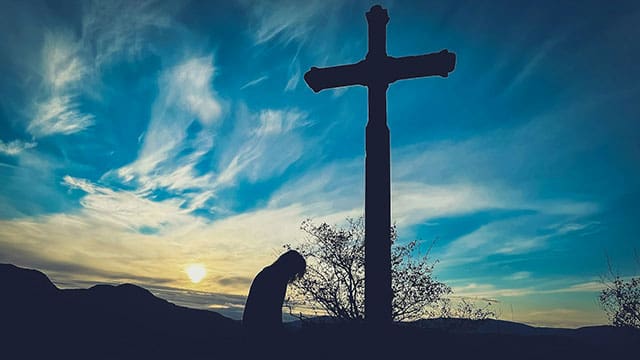As a Christian, the crucifixion of Jesus seems mild compared to how families in Gaza are being brutally eviscerated
He was despised and rejected – a man of sorrows, acquainted with deepest grief. We turned our backs on him and looked the other way. He was despised, and we did not care. – Isaiah 53 :3

I was chastised by a Christian friend last Christmas for bringing the discussion of the assault on Gaza and the West Bank into my Christmas column. He argued that Mary birthed Jesus in a dirty animal stall and that we should all be grateful for the sacrifices of the Holy Family. I retorted that such conditions would be luxurious for modern Gazans, the direct descendants of this same Jesus. I have not heard back from my friend.
Now it is Easter, and well over 30,000 people are dead in Gaza, and over 70,000 have been wounded. Record numbers have been killed in the West Bank as well.
We are told that Jesus was crucified on Good Friday for our sins. I was raised to believe that Jesus lives in every person and that when we do harm to our neighbour, we are doing harm to Jesus himself. I learned that God loves everyone, and therefore, if I dare call myself a follower of Jesus, I am obliged to treat everyone with the same dignity and respect.
I sincerely do not understand what has happened to Christianity. I am well aware that the State of Israel would not be killing Palestinians right now if its military did not have the support of millions of so-called Christians in the United States, Canada, and throughout the colonizing world.
In services at Christian churches in Canada this Holy Week, the death of Jesus is emphasized. Still, I have yet to hear mention of the countless numbers of starving Palestinian children slowly dying of hunger and dehydration, the children having their limbs amputated without anesthetic, or those dying of severe burns, experiencing unimaginable anguish in the last hours of their small lives with no pain killer.
How is this even possible? Because “he was despised and we did not care.” We classify certain groups as less than human, but how can people who do so look in the mirror and say they are Christian?
Yet, this is the history of almost every Christian church that evolved from Europe. For thousands of years, they “othered” our precious Jewish neighbours, justifying pogrom after pogrom, justifying ethnic cleansing, culminating in the Holocaust.
Outside of Europe, these same churches justified the extermination and subjugation of every Indigenous population they came into contact with.
Perhaps the reason these aspects of Christianity seem so incomprehensible to me is that I do not come from a European Christian tradition. My family practiced Catholicism in the Middle East and were one of many religious minorities in the region, which included not only Muslims but numerous Jewish communities. We often forget that Jews who experienced ethnic cleansing in Europe found themselves welcome in the Ottoman Empire and that “separate, unequal, and protected” (a phrase used by historian Ussama Makdisi) status was enjoyed by everyone until the late 19th and early 20th centuries when Europeans became more involved in the region.
Truth be told, the crucifixion of Jesus seems mild when we see how his family members in Gaza are being brutally eviscerated.
As Christians, we believe in an afterlife and the resurrection. The innocents murdered on and since October 7 will find God’s Grace and Mercy in Heaven. Hopefully, those who are left can find healing from the trauma they continue to be subjected to. That in itself would be a miracle.
Perhaps the greatest resurrection miracle of all, however, will be recreating the peaceful and respectful coexistence of Muslims, Christians, and Jews as it existed in the Middle East before European involvement.
Gerry Chidiac specializes in languages and genocide studies and works with at-risk students. He is the recipient of an award from the Vancouver Holocaust Education Centre for excellence in teaching about the Holocaust.
For interview requests, click here.
The opinions expressed by our columnists and contributors are theirs alone and do not inherently or expressly reflect the views of our publication.
© Troy Media
Troy Media is an editorial content provider to media outlets and its own hosted community news outlets across Canada.


